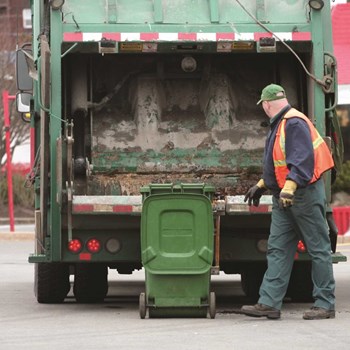
Removing a multifamily community's trash and recyclables is an important job, especially in a private development that is not served by municipal or city-run sanitation services. And though it is crucial to their daily lives, most people don’t think much about the garbage after they throw it in the chute or into a container for pickup. But who removes the trash, how frequently it is collected and what is recycled are concerns that many Chicagoland co-op or condo residents should consider. Not doing so is tantamount to forgetting both the association’s bottom line and its core services.
Public or Private
While choosing a dependable waste hauling company is vital to good co-op/condo management, hiring an outside contractor should be negotiated in the best interests of the community. As such, the management team and board members typically handle negotiations with the service companies that want to do business with them. But the trick in making the most of these negotiations is in knowing what questions to ask of a carter, as well as what to expect of them.
Understanding what a community needs from its waste hauling company, as well as what the hauler can provide for the community, are good places to begin learning about the waste management process. Only after evaluating the community’s needs and much more, such as what the association can afford, can a building community determine which waste disposal solutions are best for them.
The main difference between private waste management companies and public municipal sanitation services is often first defined by local law. Some municipalities and cities have their garbage handled through municipal services, and if you have such a service you usually can’t opt out of it. But even in communities that receive the city’s waste removal service, tons of garbage quickly accumulates from resident move-outs, building renovations, evictions and other trash-generating instances. Often, these situations are cleaned up by private waste carters.
Public waste removal services differ from private carting companies in a few ways, including frequency of service. Chicago’s garbage trucks work on a set schedule, with changes dependent upon holidays. Private carters, though, will remove garbage from a community or multifamily building as frequently as the building’s management would like.
Private waste management companies will serve all of a community’s refuse needs, while municipal waste disposal services typically cater to residential waste removal. With city garbage removal, a customer’s options are limited, while with private companies a ramge of services are available.
“With private companies you typically get more innovations and efficiency,” says Rick Bulthuis, municipal services manager for Republic Services, a national waste management company that is Chicago’s second largest carter. “We provide the full range of waste and recycling collection. It could include multiple pickups a week, compaction equipment, and even educational materials to inform residents about recycling. Private companies will serve all needs.”
Those needs, depending upon the community, might include special recycling days for electronics or for old furniture pickup, for example. Electronics recycling should be increasing in frequency in Illinois. Beginning this year, electronics have been banned from landfills in the state, so more residential communities should be contracting for the service if they don’t already have it.
Eco-minded residents are calling for changes, too. In some buildings, many residents are very concerned with lowering their carbon footprint as well as that of their vendors. In such communities, residents might find it worthwhile to hire a carter that uses natural gas-powered vehicles because of their greener impact on the environment.
Bidding and Vetting
When a multifamily community can choose its carting service, residents have the most say in how the service will be delivered to them. But they can only voice those preferences if they know their options and what services are crucial for them to receive. They also should know a bit about what factors contribute to the waste management company’s pricing, such as fuel costs, which can fluctuate throughout the year, and over which carters have no control.
As with any maintenance agreement such as one for landscaping services, signing a private waste removal company should follow a routine course. First, a management company publicizes an RFP (request for proposals) for carters seeking a contract to perform waste removal services for the building community. Specifications such as the parameters of the contract are provided in an advertisement for carters, who respond by sending a proposal outlining the work they will do under the contract and at what price. Having plenty of options to consider before choosing a carter is recommended, so see that your building’s RFP is distributed to many different companies. Having an open, competitive bidding process is best so that the board/management team can weigh all their options.
When responding to an RFP, employees of a contractor will assess the property to research a bid before submitting the proposal. The carting company will want to know how many days a week service will be provided to the building, and if there will be any restraints to entrance to the building, such as a locked garage that can only be opened by a security guard. Hours of operation issues, and other potential problems such as questions regarding overhead wires or clearance, also will be of interest to a carter, as will be the question of how much trash the building generates.
Typically, waste removal contracts are for a term of one to five years. Automatic renewal is usually not in force. Many waste management companies will allow the building to renegotiate the contract before it is over, particularly if different aspects of the contract no longer fit the building’s needs. Especially in this economy, where some buildings have many vacancies, renegotiating a garbage removal contract could be important to the community’s fiscal health, Bulthuis says. “We want to be a proactive partner with all of our customers,” he says.
Republic Services, as well as many other waste management companies, try to cater to the needs of its clients, however esoteric they might seem to others. For example, some communities want to reduce unnecessary noise in the city and will pay their vendors to help them do so. To be responsive to those needs, some companies, such as the national carter Waste Management, are increasingly using cleaner burning, quieter trucks which run on compressed natural gas. These trucks run more efficiently, and many residents appreciate them being used rather than the usual gasoline-run trucks, Waste Management spokesman Bill Plunkett says.
Picking the right carter is more than a question of the company’s offerings, availability and price, though all three factors must be considered. In considering who to choose, the board/ management team should think beyond payment terms and ask how long the company has been in business, as well as what its overall reputation is. Has it had any problems recently, with authorities or lawsuits? Some carting companies have been known to violate local laws by overloading trucks, which then damage local streets, or by driving poorly maintained vehicles, which leak or pollute neighborhoods.
When vetting a carting company, the board/management team should first ask the company whether it can provide all of the services the building community requires. Can the company provide recycling services and if so, which kinds of recycling? If, after the carter is hired there is an issue with the service, can the building’s management contact the carter easily and have the staff quickly fix the problem? What types of receptacles will the company provide to the customer as part of the contract, and how many containers will be needed for the building or individual owners? Can the carter provide educational literature for residents, and will the company provide signage that might be needed for the garbage containers/ trash receptacle areas?
Another key question to ask a potential carter is to ensure that their equipment is safe and up to date and that the company keeps timely maintenance logs. You should find out about the company’s hiring requirements and ask if the company has a drug testing program. The board/management team should also check the company’s safety record with the state Department of Transportation.
It’s important to check to see that the company’s insurance—be it liability or vehicle insurance—is up-to-date, as well as its licenses for operation. Current registration of vehicles with the state’s Vehicle Services Department also is crucial, since an omission in any of the aforementioned areas should be considered a large red flag. A company that is not properly licensed could be a fly-by-night firm.
It’s also important to know what the payment terms will be for the carter’s contract, and who at the building will be the financial point of contact for the carter if anything goes awry with payments. Waste hauling companies are often paid monthly, but some pay their drivers weekly and have their own transfer facility, which could affect their pricing.
“A company like Waste Management is fully insured for any issue, but every property has different needs,” Plunkett says. Some customers find it beneficial that Waste Management not only has cleaner burning trucks, but also tipping facilities, landfills, and even waste energy plants. These plants are fueled by solid waste, creating steam power. To some customers, such vertical integration of the trash hauling process just makes more sense, he adds.
Weighty Considerations
Tonnage factors into pricing, which is why residents should be mindful of how much refuse they are generating. There are ways to lower the amount of waste going into the carting stream, though, such as through in-home composting kits and by using garbage disposals.
When you think about how much solid food waste a typical homeowner creates each day, the amount of waste that piles up, just from meals, is staggering. Food waste is 70 percent water, and comprises a significant portion of all garbage created by multifamily communities.
When a building reduces its food waste, it reduces its carting costs by reducing the amount of tonnage that is carted. Garbage disposals get rid of all food waste, including bones, by grinding it up and flushing it into the sewer system. Disposed waste this way is seemingly a more eco-friendly management method.
“The average homeowner generates two to five pounds of food waste per day,” says Clint Taylor, New York manager for InSinkErator, which is headquartered in Racine, Wisconsin, and is the largest manufacturer of garbage disposals in the country. “The purpose of the food waste disposer is to take the food waste out of the solid waste stream, not have it carried away in trucks, and keep it out of landfills.”
Whether your building or association opts to use a carting company, individual disposal units, or even composting, the key is to remember that there are multiple options for dealing with your community's waste. Hiring a waste removal company is just like hiring any service professional; there's some legwork involved in finding the best fit, and in establishing and maintaining a good working relationship. Choosing the right company or technology can both save money and reduce environmental stress but it's up to your board and management to research the possibilities and make the best choice for your community's needs.
Jonathan Barnes is a freelance writer and a frequent contributor to The Chicagoland Cooperator.






Comments
Leave a Comment